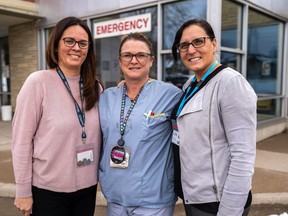
A first-of-its-kind partnership between the Alzheimer Society and hospitals in Brantford and Norfolk is keeping dementia patients out of the emergency room.
The Dementia, Resource, Education, Advocacy, Mentorship (DREAM) team aims to intervene early and get people with dementia — and their caregivers — more appropriate support, instead of having languish patients in a hospital bed.
“This team jumps in and tells them all about the resources available, and teaches them ways of coping so they don’t have to use the emergency room as the first stop when they’re in a crisis,” said Jennifer Miller, a project manager with the Brantford Brant Norfolk Ontario Health Team, which funds and oversees DREAM teams at Brantford General and Norfolk General hospitals.
The program launched in Brantford in April 2021 because hospital staff saw burnt-out caregivers bringing their loved ones with dementia to the emergency department as a last resort.
“They get fed up, and they don’t know where else to go,” said Janine Reimer, manager of clinical programs and services with the Alzheimer Society of Brant, Haldimand-Norfolk, Hamilton and Halton.
Alzheimer Society staff work with hospital employees to identify patients who show signs of cognitive impairment but are not in medical distress.
Those patients, and their caregivers, are told about support services they can access to keep their loved ones with dementia at home and avoid a lengthy hospital stay.
“Having us there means they don’t have to go anywhere else. We can address their needs in the moment and continue to support them going forward,” Reimer told The Hamilton Spectator.
Available resources from the Alzheimer Society — which can be accessed regardless of whether the patient has a formal diagnosis — include home-care workers who can give family members a much-needed break to run errands or take a nap.
Having dementia specialists in the emergency room means patients can get in and out faster, Reimer added. Instead of having to be restrained due to what can be seen as aggressive behavior — but is rooted in the patient being overstimulated — the DREAM team can provide sensory devices like noise-cancelling headphones, an iPad, or a fidget blanket to distract the patient so nurses can take blood work and do any needed assessments.
Getting patients out of the hospital quickly has far-reaching ramifications, Reimer noted. The longer a patient struggles in their restraints, the less likely they will be in a state to be discharged. Then they further deteriorate while spending their days in a hospital bed.
“And then they can’t walk, and then there’s no hope left. All they have to look forward to at that point is long-term care,” Reimer said.
The collaborative approach has already seen encouraging results at Brantford General — the first hospital in Ontario to launch the DREAM program — and in Norfolk.
In the first 15 months in Brantford, interventions from the DREAM team diverted 156 hospital admissions — more than half of the dementia patients who came to the emergency department — and diversion rates are similar at Norfolk General since the program started there in January.
“It’s like teamwork makes the DREAM work,” Miller said with a smile.
Stephanie Saur, a psychogeriatric resource consultant with the Alzheimer Society who advises health-care organizations as to what dementia-related supports are available locally, sees the difference the DREAM team makes for people living with dementia and their “exhausted” caregivers who come to Norfolk General’s emergency department.
“The earlier connection to services is involved, the less likely the individual is going to visit the ED again,” Saur said.
The need for the timely delivery of dementia support services will only increase as the population ages, making partnerships like the DREAM team essential, Reimer said. The program is funded at both hospitals through the end of 2024, and Reimer and Miller are eager to see the model spread to Hamilton and beyond.
JP Antonacci is a Local Journalism Initiative Reporter based at The Hamilton Spectator. The program is funded by the Government of Canada.

Comments
Postmedia is committed to maintaining a lively but civil forum for discussion and encourages all readers to share their views on our articles. Comments may take up to an hour for moderation before appearing on the site. We ask you to keep your comments relevant and respectful. We have enabled email notifications—you will now receive an email if you receive a reply to your comment, there is an update to a comment thread you follow or if a user you follow comments. Visit our Community Guidelines for more information and details on how to adjust your email settings.
Join the Conversation